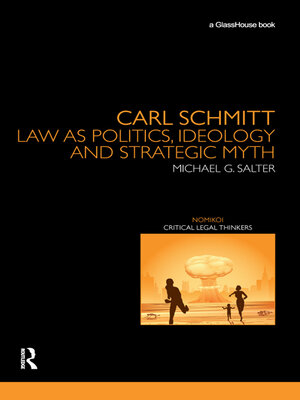Carl Schmitt
ebook ∣ Law as Politics, Ideology and Strategic Myth · Nomikoi: Critical Legal Thinkers
By Michael Salter

Sign up to save your library
With an OverDrive account, you can save your favorite libraries for at-a-glance information about availability. Find out more about OverDrive accounts.
Find this title in Libby, the library reading app by OverDrive.



Search for a digital library with this title
Title found at these libraries:
| Library Name | Distance |
|---|---|
| Loading... |
There continues to be a remarkable revival in academic interest in Carl Schmitt's thought within politics and social theory but this is the first book to address his thought from an explicitly legal theoretical perspective. Transcending the prevailing one-sided and purely historical focus on Schmitt's significance for debates that took place in the Weimar Republic 1919-1933, this book addresses the actual and potential significance of Schmitt's thought for controversies within contemporary Anglo-American legal theory that have emerged during the past three decades. These include: the critique of liberal forms of legal positivism; the relative 'indeterminacy' of legal doctrine and the need for an explicitly interpretative approach to its range of meanings, their scope and policy rationale; the centrality of discretion and judicial law-making within the legal process; the important role played by ideological prejudices and assumptions in legal reasoning; the reinterpretation of law as a form of strategically disguised politics; the legal theoretical critique of universalistic approaches to "human" rights and associated liberal-cosmopolitan 'ideologies of humanity,' including the rhetoric of 'humanitarian intervention'; and the limitations of liberal constitutionalism and liberalism more generally as an approach to law.
In Carl Schmitt: Law as Politics, Ideology and Strategic Myth, the author provides an overview and assessment of Schmitt's thought, as well as a consideration of its relevance for contemporary legal thought and debates.







